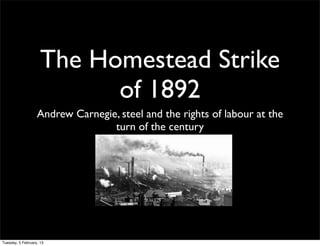
Homestead strike
- 1. The Homestead Strike of 1892 Andrew Carnegie, steel and the rights of labour at the turn of the century Tuesday, 5 February, 13
- 2. Andrew Carnegie Steel magnate “Richest Man In America” Tuesday, 5 February, 13
- 3. Homestead Steel Works Tuesday, 5 February, 13
- 4. Price of Steel • Was dropping from $35 a ton to $22 • Wages needed to be cut • What to do? Tuesday, 5 February, 13
- 5. Break the union The Amalgamated Association of Iron and Steel Workers Tuesday, 5 February, 13
- 6. Henry Frick Andrew Carnegie “We... approve of anything you do.” Tuesday, 5 February, 13
- 7. The Frick Collection in New York Tuesday, 5 February, 13
- 8. There had been other strikes in 1892. Railway switchmen in Buffalo Coal miners in Tennessee Copper miners in Idaho Tuesday, 5 February, 13
- 9. Frick locks out 1,100 workers They burned him in effigy They just wanted to keep their union Tuesday, 5 February, 13
- 10. "This is your chance to re-organize the whole affair," Carnegie wrote to Frick. "Far too many men required by Amalgamated rules." Tuesday, 5 February, 13
- 11. Workers began to guard the plant themselves. Frick ordered in Pinkertons private army to disband the workers. Tuesday, 5 February, 13
- 12. Three detectives, 9 workers were dead or dying. PA militia called in. Strike disbanded. Strikers charged. Tuesday, 5 February, 13
- 13. Union was busted 1891: 24, 000 members 1894: 10, 000 Carnegie and Frick got their way. Tuesday, 5 February, 13
- 14. What does the Homestead Strike of 1892 tell us? St. Paul Daily Globe, July 3 1892 Tuesday, 5 February, 13
- 15. "It's easy to say that Carnegie was a hypocrite," states historian Joseph Frazier Wall. "And there is an element of hypocrisy clearly in between what he said and what was done. But it's a little too easy to simply dismiss the whole incident on Carnegie's part as an act of hypocrisy. There is this curious reason as to why Carnegie felt it necessary to even enunciate the rights of labor. Frick was the norm, not Carnegie, in management's relationship with labor at that time. And, one can only answer that, once again, it's being torn between wanting to pose as a great democrat and liberal and at the same time wanting to make sure Carnegie Steel came out on top." Tuesday, 5 February, 13